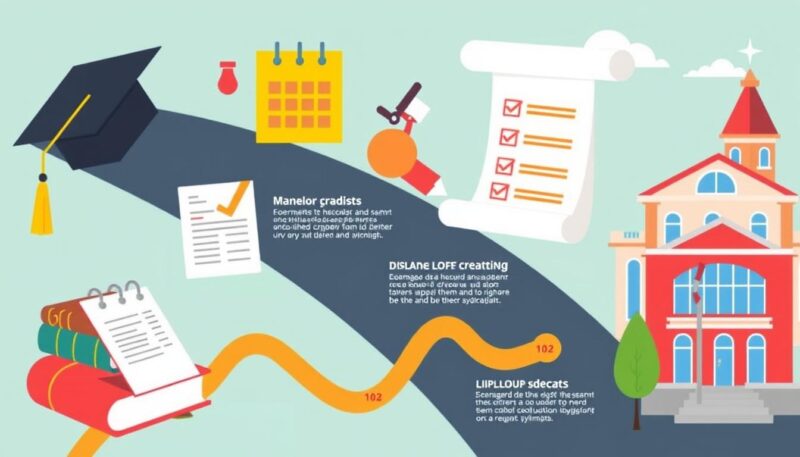Embarking on the quest for a bachelor’s degree is a transformative journey that shapes not just your educational credentials, but also your career opportunities and life trajectory. In today’s competitive job market, the importance of obtaining a bachelor’s degree cannot be overstated. This academic milestone acts as a key that unlocks numerous professional doors. But you might be wondering: how do I get a bachelor’s degree? What should I expect throughout this intricate process?
This article delves into the comprehensive bachelor’s degree process, elucidating what you need to know from the start and the academic workload that lies ahead. With typical completion times ranging from four to five years, understanding the requirements and demands of this educational pursuit can pave the way for informed decision-making. Expect crucial insights regarding costs, financial aid options, and essential steps to embark on your educational journey.
By the end of this article, you will have a clearer picture of the routes available to you, revealing the potential benefits that come alongside your degree. Not only will you gain vital knowledge, but you will also be equipped to navigate the challenges and realize the rewards that a bachelor’s degree can offer.
Understanding the Importance of a Bachelor’s Degree
A bachelor’s degree represents a vital stepping stone in your educational journey, serving as a gateway to numerous career opportunities. This undergraduate academic degree is awarded by colleges and universities after a program that typically lasts four years. It encompasses a variety of disciplines, providing you with the necessary foundation to excel in your chosen field.
What is a Bachelor’s Degree?
A bachelor’s degree can take the form of different types, such as Bachelor of Arts (BA), Bachelor of Science (BS), or Bachelor of Fine Arts (BFA). Each type allows for a focused study while meeting general education requirements. Achieving this degree enhances your qualifications, making you a more attractive candidate in a competitive job market.
Benefits of Earning a Bachelor’s Degree
The benefits of a bachelor’s degree extend beyond education. Statistics indicate that college graduates enjoy significant advantages in job opportunities and financial stability. In fact, graduates see 57% more job opportunities than non-graduates. Additionally, over 80% of job openings for positions requiring a bachelor’s degree are advertised online, compared to only 50% for jobs needing only a high school diploma. The unemployment rate for individuals over 25 with a bachelor’s degree is just 2.3%, while high school graduates face a much higher rate of over 4%.
Average Salary Comparison
In terms of earning potential, individuals with a bachelor’s degree earn an average annual salary of $67,500, compared to a national average of slightly below $56,000. This striking difference highlights the financial rewards that come with obtaining a degree. By achieving a bachelor’s degree, you not only improve your immediate job prospects but also set yourself up for a more profitable long-term career trajectory.
| Degree Level | Average Annual Salary | Unemployment Rate |
|---|---|---|
| High School Diploma | $48,000 | 4.5% |
| Bachelor’s Degree | $67,500 | 2.3% |
| Master’s Degree | $82,000 | 2.0% |
The above averages present a clear picture of how educational attainment influences earning potential and job stability. The investment in a bachelor’s degree ultimately brings substantial returns in terms of salary and career advancement opportunities.
How Do I Get a Bachelor’s Degree?
Embarking on the journey to earn a bachelor’s degree requires careful planning and a clear understanding of the steps to get a bachelor’s degree. Knowing what lies ahead can streamline the process and enhance your experience. This section will explore the essential steps, application requirements, and the nuances of choosing a major.
Steps to Begin Your Journey
Starting your educational journey involves several significant steps. First, focus on researching potential colleges and their programs. Seek institutions that align with your career ambitions and personal interests. You might consider taking online classes to earn college credits before applying. Typically, completing a standard bachelor’s degree program requires about four years and 120 credit hours, but there are alternative paths available.
- A full-time student may complete the degree in four years.
- Part-time students have the flexibility to take up to six years.
- Accelerated programs can allow completion in as little as three years.
Application Requirements for Bachelor’s Degrees
Understanding the application requirements is crucial as you prepare to submit your college applications. Most colleges necessitate standardized test scores, such as the SAT or ACT. You will also need letters of recommendation and a personal essay detailing your ambitions and qualifications. It is vital to present your academic records, including your high school GPA, which should ideally be above the minimum requirement of 2.0, along with proof of graduation with a high school diploma or GED.
Gathering these materials early in the process simplifies your journey and allows for a smoother transition into college life. Successful navigation of these requirements significantly impacts your admission prospects.
Choosing the Right Major
Choosing a major plays a pivotal role in your degree planning and future career opportunities. Reflect on your interests and professional goals to choose a major that aligns with your aspirations. Many programs require between 30 to 40 credit hours for a major, which further shapes your academic workload throughout your college years. By understanding both the academic landscape and job market trends, you can make an informed decision that will position you for success after graduation.

Cost and Financial Aid Options for Your Education
Understanding the financial landscape of higher education is essential when pursuing a bachelor’s degree. Various factors influence the cost of a bachelor’s degree, including institution type and location. Along with tuition fees, it is important to consider additional living expenses and materials required for your studies.
Tuition and Additional Costs
The cost of tuition can vary greatly. For the 2023 academic year, total annual expenses at a public university averages around $9,400. Private nonprofit institutions typically charge approximately $37,600, while private for-profit schools reflect higher expenses of about $18,200 annually. Keep in mind that these figures do not include other costs, such as textbooks, transportation, and housing.
Financial Aid and Scholarships
To navigate the financial burden of college, various financial aid options are available. Grants like the Federal Pell Grant offer up to $7,395 to students demonstrating financial need. Scholarships, often merit-based or targeting specific demographics, can further alleviate tuition expenses; smaller scholarships may even have fewer applicants, increasing your chances of obtaining funding. Completing the FAFSA is crucial to unlock these opportunities and secure state aid, work-study funds, and many private scholarships that often do not require repayment.
Understanding Student Loans
While many students engage with scholarships and grants, understanding student loans remains crucial. Dependent first-year students may borrow up to $3,500 under Direct Subsidized Loans. Graduate students can secure up to $20,500 per year through Direct Unsubsidized Loans. It is important to consider that repayment on federal loans starts six months after graduation or once you cease classes, which underscores the importance of managing loan amounts effectively to avoid overwhelming debt post-graduation.

Conclusion
Earning a bachelor’s degree is a significant stepping stone toward your personal and professional development. As you reflect on the bachelor’s degree importance, consider that this educational credential opens the door to a variety of high-paying jobs, leading to substantial career advancement. With bachelor’s degree holders enjoying a 62.8% increase in earnings compared to their peers without a degree, it’s clear that this investment in educational growth pays off over time.
The journey to obtaining a bachelor’s degree typically spans four years, with options for accelerated programs that can reduce this time frame to as little as two years. Planning and commitment are essential as you navigate tuition costs and financial aid options, which can range from scholarships and grants to student loans. While the average annual cost of earning a bachelor’s degree stands at $38,270, including living expenses and supplies, the long-term benefits greatly outweigh the initial financial considerations.
In addition to enhanced earning potential, a bachelor’s degree significantly impacts your career opportunities, as evidenced by an unemployment rate of just 2.2% for degree holders compared to 3.9% for those with merely a high school diploma. As you embark on this educational journey, remember that this path is not only an investment in a degree but also a crucial step in achieving your overall career aspirations and securing a successful future in today’s competitive job market.

